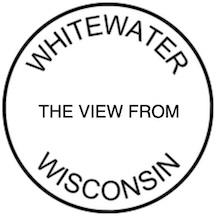Good morning.

Sunday will be partly cloudy with a high of 76. Sunrise is 5:17 and sunset 8:37 for 15h 19m 58s of daytime. The moon is a waning gibbous with 97.4 percent of its visible disk illuminated.
On this day in 1911, native John Schwister becomes a pioneer in Wisconsin aviation by flying the state’s first home-built airplane. The plane, named the “Minnesota-Badger,” was constructed of wooden ribs covered with light cotton material. Powered by an early-model aircraft engine, the “Minnesota-Badger” flew several hundred feet and reached a maximum altitude of 20 feet. [Source: Wisconsin Aviation Hall of Fame.]
On this day in 1917, in a game against the Washington Senators, Boston Red Sox pitcher Ernie Shore retires 26 batters in a row after replacing Babe Ruth, who had been ejected for punching the umpire.
Sarah Lehr offers a primer revealing laxity of Wisconsin’s attorney regulation in Will former Dane County Judge Jim Troupis lose his law license over false elector plot? (Troupis, along with Kenneth Chesebro and Michael Roman, face felony charges in false elector plot):
Felony conviction doesn’t necessarily lead to loss of Wisconsin law license
But, even if he’s found guilty, a felony conviction would not automatically lead to the loss of Troupis’ law license.
That’s unlike in other states, such as Texas and Maine, where people with felony convictions cannot practice law.
“Not all crimes are created equal and not all result in discipline,” said Stacie Rosenzweig, an attorney who specializes in legal ethics and licensing.
In Wisconsin, attorneys must report to the state’s Office of Legal Regulation and the Wisconsin Supreme Court if they’re convicted of crime, whether that’s a felony or misdemeanor, Rosenzweig said.
That report triggers an investigation from the office. But Rosenzweig said regulators will only pursue disciplinary action if they determine that the crime reflects negatively on someone’s ability to practice law.
Attorney rules prohibit dishonesty, fraud
“Crimes involving dishonesty, misrepresentation fraud — those are always going to reflect aversely to varying degrees,” Rosenzweig said. “Truthfulness is paramount.”
A section of the Wisconsin Supreme Court’s rules of professional conduct bars attorneys from actions “involving dishonesty, fraud, deceit or misrepresentation.”
Those rules apply “24/7,” Rosenzweig said.
“Whether you’re practicing law at the time or not, you’re not allowed to lie or commit fraud,” Rosenzweig said. “So anything like that is going to be looked at.”
The better standard would be to apply an automatic suspension for any attorney convicted of a felony, pending a subsequent disciplinary proceeding (to suspend, disbar, reprimand & restore to practice, or simply restore to practice). The public — clients and potential clients — are best protected when disciplinary actions place them as the group of preeminent concern.
That’s not Wisconsin’s approach, but an approach that does not address the public first and practitioners second disrespects both the public and the practitioner.
See also Troupis’s Suspension (Criminal Defendants Don’t Belong on Judicial Advisory Panels) (describing suspension from an advisory panel, not the practice of law).
How French artist Henri Roche developed his #pastels:
